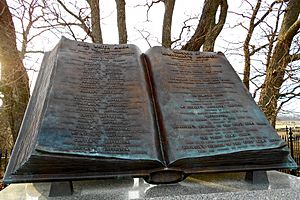High Water Mark of the Rebellion Monument facts for kids

The front tablet on the High Water Mark of the Rebellion Monument is on a pedestal (bottom) in front of the Copse of Trees
|
|
| Coordinates | 39°48.747′N 77°14.143′W / 39.812450°N 77.235717°W |
|---|---|
| Location | Gettysburg National Military Park, Pennsylvania |
| Designer | John B. Bachelder |
The High Water Mark of the Rebellion Monument is a special memorial at the Gettysburg Battlefield in Pennsylvania. It marks the spot where the Confederate Army made its deepest push into the Union lines during the Battle of Gettysburg. This happened on the third day of the battle, during a huge attack known as Pickett's Charge.
The monument shows where the Confederate soldiers reached before they were stopped. It also honors the Union soldiers who fought bravely to push them back. This spot is often called the "high water mark" because it was the furthest point the Confederates reached in the entire American Civil War. It was a major turning point in the war.
You can visit this monument by going to Hancock Avenue in the Gettysburg National Military Park. There are parking spots nearby, and a path leads right to the monument.
Contents
What is the High Water Mark?
The "High Water Mark of the Rebellion" refers to the exact place where the Confederate attack during Pickett's Charge reached its peak. This was the deepest point they got into the Union Army's defenses. After this, the Confederate attack failed, and they had to retreat.
This line is now marked by many smaller monuments for different army units. These markers help us remember the soldiers who fought there. The main High Water Mark monument stands as a central reminder of this important moment.
How was the monument created?
The idea for this monument came from John B. Bachelder. He was a historian and artist who studied the Battle of Gettysburg very closely. He believed this spot was the most important turning point of the battle and the war.
Designing the Monument
Bachelder wanted to create a monument that would clearly show this "high water mark." He proposed his idea to the Gettysburg Battlefield Memorial Association. This group was in charge of preserving the battlefield. It took him three tries, but his plan was finally approved.
Dedication Ceremony
The monument was built and ready by April 1892. It was made with a large bronze tablet. During its creation, two army units were accidentally left off the tablet. So, the monument was recast to include them.
The dedication ceremony was a big event. Former Governor James A. Beaver gave a speech. He spoke about how important it was for the battlefield to become a National Park. The Marine Corps Band played music. Several Union Generals, like John Schofield, Henry Warner Slocum, and Alexander S. Webb, also gave short speeches. Finally, the monument was officially presented to the Gettysburg Battlefield Memorial Association.
Later Additions
In 1895, another tablet was added to the monument. This tablet listed the names of the directors of the Gettysburg Battlefield Memorial Association. The monument continued to be a place for people to learn about the battle. For example, in 1897, a lecture was given there to over 7,000 visitors.
 | Valerie Thomas |
 | Frederick McKinley Jones |
 | George Edward Alcorn Jr. |
 | Thomas Mensah |

